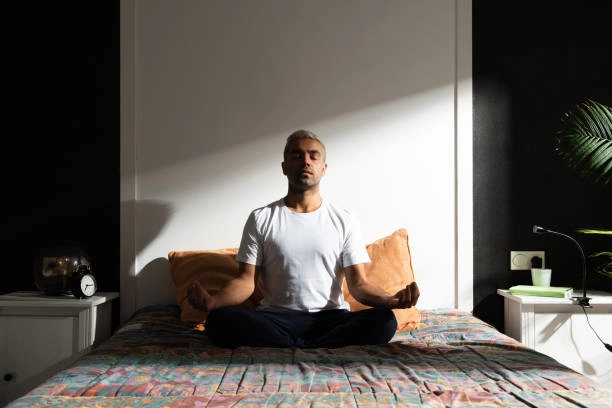Mechanisms of How Meditation Improves Sleep
Meditation involves training the mind to focus completely on one point, creating a stream of focused consciousness. When this stream of consciousness enters a certain realm without active thinking, it clears away other mental distractions—such as negative emotions and stress triggers—bringing calmness and health to life.
Consciousness, Thought, Thinking, and Meditation
- Consciousness: In modern psychology, consciousness refers to a person’s awareness and attention to the external world and themselves. Broadly, it’s considered the subjective experience of an individual, integrating knowledge, emotions, and intentions.
- Thinking: A cognitive exploration activity.
- Thought: Mental activity and its outcomes, including ideas, notions, and concepts.
- Meditation: The observation and management of thoughts.

How Meditation Improves Sleep
Modern Sleep Medicine Explanation
- Causes of insomnia: An imbalance in the sleep-wake cycle caused by excessive excitement or stimulation during both night and day.
- Effects of insomnia: Excessive excitement, which disrupts the sleep rhythm both at night and during the day.
Meditation practitioners can more easily balance their excitement levels, preventing overstimulation.
Cognitive, Emotional, and Physiological Changes in Insomniacs
- Cognitive changes: Insomniacs often have competitive thoughts and selectively focus on specific stimuli.
- Emotional changes: They frequently express excessive worry.
- Physiological changes: These include signs of overexcitement, such as increased metabolism, elevated cortisol levels, higher glucose consumption in the brain during wakefulness and sleep, and elevated blood pressure and brainwave activity during sleep.
Meditation can alter the cognitive, emotional, and physiological states of insomniacs, reducing insomnia.
Meditation’s Health Benefits for Sleep
- Reduces stress, alleviates anxiety, and stabilizes emotions. It balances the activity of the sympathetic and parasympathetic nervous systems, reducing physical tension.
- Lowers chronic inflammation levels, improves cardiovascular health, and relieves muscle pain.
- Enhances the immune system by increasing the number of antibodies and boosting immunity.
- Improves brain function, enhancing attention, focus, observation, learning, memory, and creativity.
- Lengthens telomeres, delaying aging, which helps maintain the function of sleep centers in the brain.

Mechanisms of Meditation Improving Sleep
1. Changing Neural Excitability
Research shows that meditation activates the anterior cingulate cortex, regulating autonomic nervous function and improving sleep. This part of the brain processes bodily and visceral reactions to pain, grievance, sadness, and anxiety.
Meditation promotes parasympathetic activity while reducing sympathetic excitement, easing physical tension and improving sleep quality. Within 20 minutes of meditation, the intensity of brain beta waves decreases, which is key since one cause of insomnia is autonomic nervous system dysfunction.
2. Changing Endocrine Mechanisms
Meditation can regulate the hypothalamic-pituitary-adrenal (HPA) axis, adjusting the levels of cortisol, catecholamines, growth hormone, thyroid-stimulating hormone, prolactin, and melatonin.
Studies show that meditators have significantly higher levels of melatonin at night than non-meditators, suggesting that meditation can enhance melatonin levels and improve sleep quality. A decline in melatonin secretion is one of the reasons for poor sleep in older adults.

3. Changing Sleep Structure
Meditation practitioners experience specific changes in their sleep architecture. Compared to non-meditators, high-level meditators show enhanced slow-wave sleep and REM (rapid eye movement) sleep.
As people age, slow-wave sleep decreases significantly in non-meditators, but older meditators maintain sleep patterns similar to younger non-meditators. Poor sleep quality is often associated with deteriorated sleep architecture.
4. Changing Brain Structure
Meditation increases the number and strength of synapses, promoting connectivity between neurons and enhancing brain plasticity. Long-term meditation may increase cortical thickness, particularly in areas related to attention, emotional regulation, and self-awareness.
Recommended Reads to Nourish the Soul:
Exercise for Seniors: Daily exercise to build balance and boost confidence, yoga aspect
21 Easy Three-Step Dinner Recipes for Weight Loss: Helping You Lose Weight Effectively
Yoga Healing: 100-Style Yoga Provides Comprehensive Care From Shoulders And Neck To Meridians







